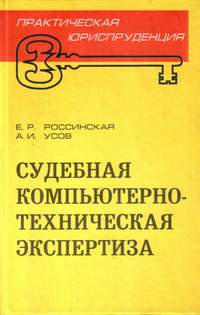Elena Rossinskaya, Alexander Usov JUDICIAL COMPUTER-TECHNICAL EXPERTISE (JCTE)

This is the first book published in Russia which relates to a new developing type of judicial expertise - judicial computer-technical expertise (JCTE). It is actually impossible to study and to use computer evidence information without the special knowledge. Therefore the role of this expertise and special scientific technical knowledge in general is highly important for the investigation of computer crimes and judicial consideration of criminal and civil cases as well as administrative offence involving computer technology use.
The book views the present state of fight against crime in the field of information technologies. It gives the peculiarities of qualification of crimes and administrative offence in the use of computer equipment, it reveals some specific features of civil-legal disputes dealing with computer systems turnover. The book generalizes and systematizes theoretical and organisational fundamentals of using special knowledge in judicial proceedings of abovementioned cases. Many years of research and expert practice enable the authors to provide recommendations for applying special knowledge in the investigation and judicial procedures dealing with getting evidential information and some special points in sanctioning JCTE.
Monographically the book gives an account of the subject and aims of JCTE, the classification of its types and objects. The book presents detailed lists of questions to be solved by means of JCTE, it carries the description of typical investigations of criminal cases on using computer equipment and expert ways of their solution. Very much consideration in the book is given by the authors to some specific ways of making JCTE at the preliminary investigation or during the trial, as well as to appraisal and use of expert conclusions as evidence.
The 2nd part of the book focuses on methodical principles of JCTE, describes a system of expert means necessary for the solution of its general and special tasks. Here the authors characterize modern interfaces and PC computer storages as objects of diagnostics; specify the complex of features defining the objects of JCTE and the order an expert should follow to examine the objects. Expert methods of identifying non-licensed software use and some distinctions of JCTE computer information through Internet are also described here.
The appendices of the book offer the glossary of JCTE main terms, have comments on currect trends of foreign judicial and expert practice in high technologies field. Here a reader may also find samples of computer examination protocols, resolutions to sanction JCTE and expert decision papers. The work place of an expert is also described here.
The book is for reference of those who work in investigation, expert and judicial bodies, for lawyers and other practising law experts, scientists, students, postgraduate students and teachers of law colleges.
